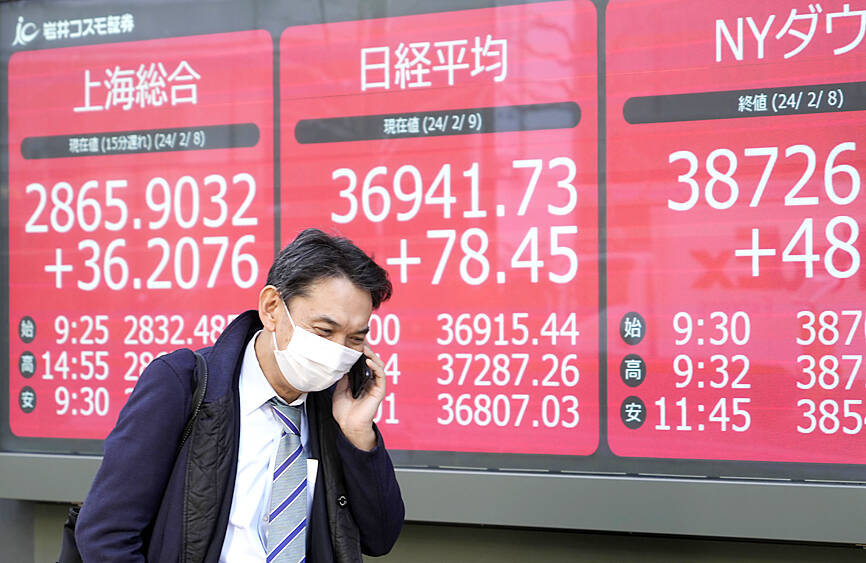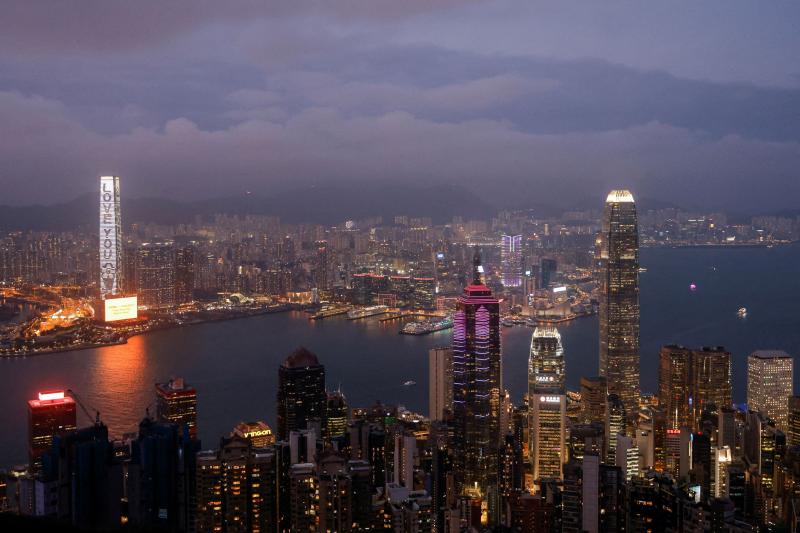Hong Kong shares made a weak finish to the zodiac year in a session shortened by the festive break, with the absence of mainland buyers leaving the market to drift lower on Friday, while Japanese shares hit 34-year highs.
At the early close of trade, the Hang Seng index was down 131.49 points, or 0.83 percent, at 15,746.58. For the week it rose 1.4 percent, but for the zodiac year of the Rabbit just ended, it dropped 28.6 percent as investors have streamed out of Chinese assets while the economy stuttered.
Hong Kong markets are closed until Feb. 14, while mainland China markets are closed until Feb. 19. Dealers said trade was quiet and the lack of inflow from the mainland contributed to the soft session.

Photo: EPA-EFE
“With China on holidays, that stock connect flow has been missing,” said Steven Leung (梁偉源) on the sales desk at UOB Kay Hian Holdings Ltd (大華繼顯控股) in Hong Kong. He said investors hope that mainland authorities will announce support for the markets during the holidays.
Tokyo’s benchmark Nikkei index closed slightly higher yesterday, supported by a weaker yen and a soaring Softbank Group Corp after the firm reported strong earnings, while the broader TOPIX was down on profit-taking.
The Nikkei 225 index edged up 0.09 percent, or 34.14 points, to 36,897.42, while the TOPIX index slipped 0.19 percent, or 4.75 points, to 2,557.88.

Photo: Reuters
Investors in Japan were also encouraged by remarks by Bank of Japan Deputy Governor Shinichi Uchida, who hinted the central bank will maintain its easy monetary policy stance even after ending its current negative benchmark rate.
Australia’s S&P/ASX 200 added nearly 0.1 percent to 7,644.80 and Thailand’s SET edged 0.1 percent higher.
Indian stocks were also up, while Taipei, Shanghai, Seoul and Jakarta were closed for holidays.
Wall Street’s three main indices eked out fresh gains overnight, with the S&P 500 breaking 5,000 points for the first time towards the end of trade, before edging back, but still finishing at an all-time high.
US equities have continued their march higher this week as strong earnings from big-name firms and data showing resilience in the world’s number one economy helped overcome US Federal Reserve warnings that interest rates will not come down as early as hoped.
Richmond Fed President Thomas Barkin joined several of his counterparts on Thursday in urging patience on cutting rates, adding that “no one wants inflation to re-emerge.”
He said the healthy run of data on the economy — particularly the labor market — had given the bank time to become confident that the slowdown in inflation is assured.
“For now the claims stats continue to suggest there are no firing pressures emerging in the US labour market,” National Australia Bank’s Rodrigo Catril said.
However, he warned: “That said many US commentators note that there is a meaningful risk claims will rise over coming months, amid a burst in layoff announcements (including from Deloitte, Amazon and Tesla, among others).”

On Tuesday, US President Donald Trump weighed in on a pressing national issue: The rebranding of a restaurant chain. Last week, Cracker Barrel, a Tennessee company whose nationwide locations lean heavily on a cozy, old-timey aesthetic — “rocking chairs on the porch, a warm fire in the hearth, peg games on the table” — announced it was updating its logo. Uncle Herschel, the man who once appeared next to the letters with a barrel, was gone. It sparked ire on the right, with Donald Trump Jr leading a charge against the rebranding: “WTF is wrong with Cracker Barrel?!” Later, Trump Sr weighed

HEADWINDS: Upfront investment is unavoidable in the merger, but cost savings would materialize over time, TS Financial Holding Co president Welch Lin said TS Financial Holding Co (台新新光金控) said it would take about two years before the benefits of its merger with Shin Kong Financial Holding Co (新光金控) become evident, as the group prioritizes the consolidation of its major subsidiaries. “The group’s priority is to complete the consolidation of different subsidiaries,” Welch Lin (林維俊), president of the nation’s fourth-largest financial conglomerate by assets, told reporters during its first earnings briefing since the merger took effect on July 24. The asset management units are scheduled to merge in November, followed by life insurance in January next year and securities operations in April, Lin said. Banking integration,

LOOPHOLES: The move is to end a break that was aiding foreign producers without any similar benefit for US manufacturers, the US Department of Commerce said US President Donald Trump’s administration would make it harder for Samsung Electronics Co and SK Hynix Inc to ship critical equipment to their chipmaking operations in China, dealing a potential blow to the companies’ production in the world’s largest semiconductor market. The US Department of Commerce in a notice published on Friday said that it was revoking waivers for Samsung and SK Hynix to use US technologies in their Chinese operations. The companies had been operating in China under regulations that allow them to import chipmaking equipment without applying for a new license each time. The move would revise what is known

Artificial intelligence (AI) chip designer Cambricon Technologies Corp (寒武紀科技) plunged almost 9 percent after warning investors about a doubling in its share price over just a month, a record gain that helped fuel a US$1 trillion Chinese market rally. Cambricon triggered the selloff with a Thursday filing in which it dispelled talk about nonexistent products in the pipeline, reminded investors it labors under US sanctions, and stressed the difficulties of ascending the technology ladder. The Shanghai-listed company’s stock dived by the most since April in early yesterday trading, while the market stood largely unchanged. The litany of warnings underscores growing scrutiny of